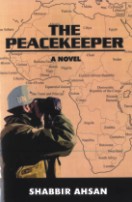|
Book Review
Brave New World
In his first novel, Shabbir Ahsan, a Major
in the Bangladesh Army, portrays the lives
of Bangladeshi peacekeepers in the
Dark Continent
Ahmede Hossain
 |
The Peacekeeper, Shabbir Ahsan, 233pp, iUniverse, New York, Lincoln, Shanghai, USD 16.95 |
Bangladesh Army was first represented in bulk on a foreign soil in 1990, after the Iraqi invasion of Kuwait. As the art of conflicts resolution and peacekeeping flourished, a demand for Bangladeshi soldiers has grown over the decades in places as remote and treacherous as the Congo and Liberia. One reason for this is the humane approach with which battalions of our boys in uniform have handled adverse situations in Africa, which in Joseph Conrad's narrator in 'Heart of Darkness' (1902) describes as venomous as a snake, and the horror that Kurtz witnesses is eerily similar to what Samir, Ahsan's protagonist goes through in war torn the Congo. From cannibalism to gun-wielding child-soldiers the novel depicts a fuller picture the threats and possibilities that Africa offers to a stranger.
What makes Ahsan's novel unique is its portrayal of reality. Though the country has been a regular participant in the UN peacekeeping efforts, the media's portrayal of the lives of the Bangladeshi soldiers abroad has been abysmal. Ahsan's novel, in fact, gives a rare glimpse into the hardships that they go through. The reason that drives these men to fight for peace in such deadly situations is sheer altruism, an indomitable urge to uphold the dignity of every human being. They are extremely popular in places where famine has ravaged through huge swathes of land or where drought has rendered it arid.
Even though it does not include their job descriptions, Bangladeshi soldiers, in every country they operate, for sheer humanitarian reasons, always help the refugees, who have lost everything but their lives, with food and water. As the novel shows sometimes our soldiers offer the hungry Africans food from their plate and there are numerous occasions in which Bangladeshi peacekeepers have given the poor money from their own purse.
Ahsan's novel, though an art of fiction, is autobiographical in nature, which would have marred its depth as a novel, had it not depicted something so unexampled. His division of the main plot, along with his handling of the central theme is extraordinary; especially if one takes into consideration the fact that the writer is a professional soldier, not a novelist. Ahsan's strength is his narrative, which is sprinkled with a touch of love, freedom and compassion.
 Ahsan actually participated in the Gulf War I, and also went to the UN peacekeeping mission in the Congo. The idea of the novel came to him when his friends showed interest by suggesting that he must write down the African stories he had been emailing them. Ahsan's beautiful prose, lush and lucid, has turned this simple story into a complex dilemma of the human psyche. Read: "The brackish smell of the seawater draped the surroundings like a blanket. The sea, eternally restless, splashed on the beach with foamy bubbles shattering the silence with a tempting hum that echoed in my heartbeat. The wind blew, slowly, sensually--like the fingertip caress of a skilled mistress on my naked back." Ahsan actually participated in the Gulf War I, and also went to the UN peacekeeping mission in the Congo. The idea of the novel came to him when his friends showed interest by suggesting that he must write down the African stories he had been emailing them. Ahsan's beautiful prose, lush and lucid, has turned this simple story into a complex dilemma of the human psyche. Read: "The brackish smell of the seawater draped the surroundings like a blanket. The sea, eternally restless, splashed on the beach with foamy bubbles shattering the silence with a tempting hum that echoed in my heartbeat. The wind blew, slowly, sensually--like the fingertip caress of a skilled mistress on my naked back."
Or: "All of a sudden, the Lendu commander came running from about twenty feet with a machete held high in the air and smacked the blade through one of the poor boy's neck. Blood spattered, the torso jerked and his severed head jumped about two feet from the rest of the body, dropped and rolled like an inflated ball on the ground."
Ahsan paints a brave new world, a world in transition, the surface of which changing shapes, and the inner self of it, driven by love, truth and beauty, is constantly striving to create a beautiful tomorrow. It will be good to see Ahsan handle other theme, better if an unfamiliar one, in the future. The Peacekeeper should not be his first and last novel; it should be his first firm step towards a giant long march.
Copyright
(R) thedailystar.net 2007
|
